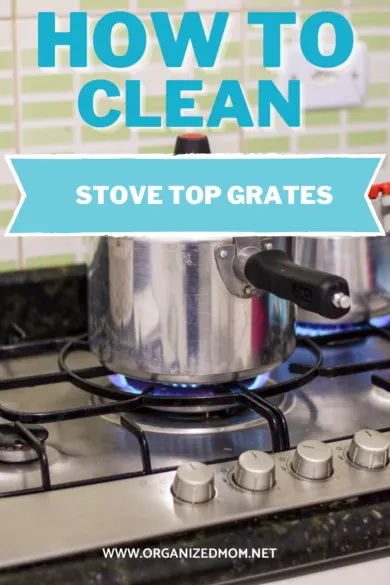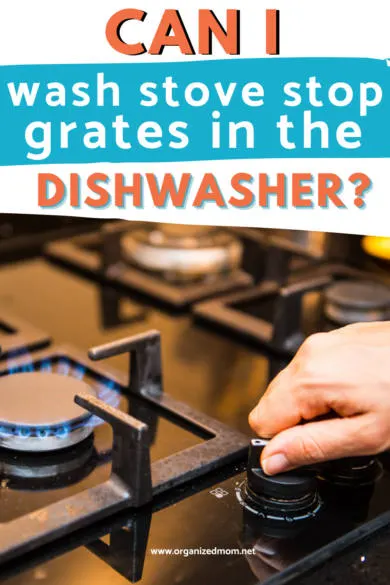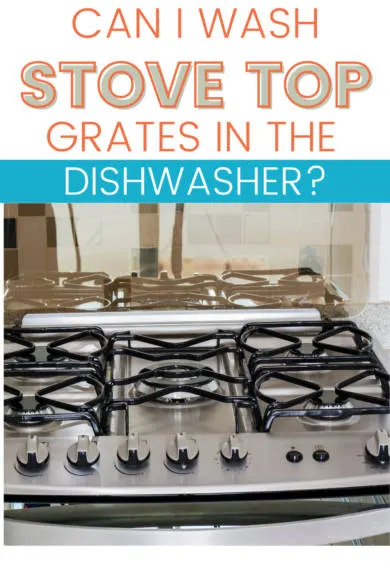Isn’t it icky when you have a grimy stove-top grate? Additionally, stove-top grates are often too large to fit in normal-sized kitchen sinks. So you end up soaking one side and then turning it over, and the water is cold and grimy too. Can’t you just chuck the grate into the dishwasher and save yourself the hassle of cleaning greasy corners and scrubbing off caked gunk?
Some stove top grates are dishwasher safe. However, you should avoid washing uncoated cast iron grates in a dishwasher as it will shorten their lifespan. Instead, you should check the stove top’s manual for cleaning instructions and avoid using a dishwasher to clean grates if unsure.
Most stove top grates are made of cast iron because they are durable, heat quickly and evenly, and are cheap to manufacture. There are other types of stove top grates that you could clean in a dishwasher, but even those come with certain risks. Let’s look at why it’s best to avoid using a dishwasher for cleaning stove top grates, plus some cleaning alternatives.
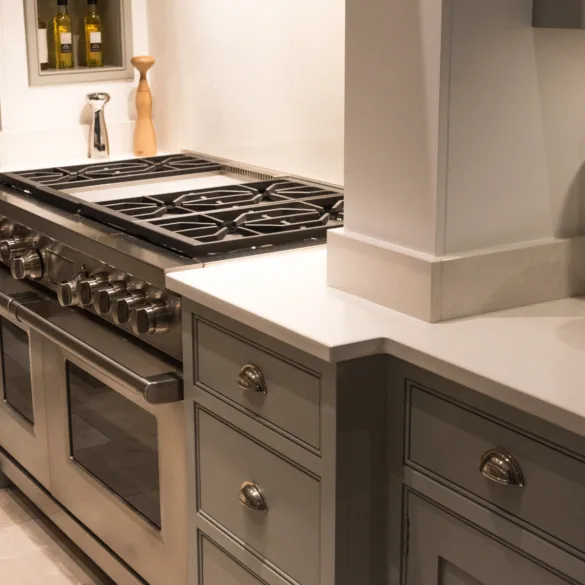
Why You Should Not Wash Stove Top Grates In The Dishwasher
Dishwashers are great. In our home, we call ours the Magic Cupboard because dishes go in dirty and come out clean. The Magic Cupboard cleans dishes at higher temperatures than my hands can handle, killing bacteria and doing the dirty work. Surely, since stove top grates can take high heat, they should be dishwasher safe?
Some stove top grates, like those made by Whirlpool and General Electric Appliances, are dishwasher safe. However, if you don’t have the manual for your stove and you’re not sure what your grate is made from, it’s wise to avoid cleaning it in the dishwasher as you could damage it and your dishwasher. A broken dishwasher and stove top grate would be double the sadness!
Stove Top Grates Can Damage Your Dishwasher
A decent stove-top grate is usually made of cast iron – a solid and heavy metal that can withstand the weight of full, heavy pots. Unfortunately, dishwashing racks and rollers are not designed to carry the considerable size and weight of a stove-top grate. As such, large grates can cause damage to the dishwasher rack – never mind other dishes in the dishwasher.
Another consideration is the spinning sprayer arm inside the dishwasher. Spinning sprayers in dishwashers are usually made from plastic or stainless steel. The bulky cast-iron grate might block the path of the spinning sprayer and damage it. Apart from the annoying clunking sound it will make, the grate won’t be cleaned either – it will just be dirty and wet.
Uncoated Cast Iron Stove Top Grates Will Rust
As durable as cast iron is, it will rust if exposed to excessive water or corrosive detergents in dishwashing soaps. Cast iron has an oil ‘seasoning’, which gives it its non-stick properties.
Dishwashing detergents are designed to strip away oil and grease. Therefore, they will strip the protective oil seasoning on the grates, exposing the cast iron to oxidization and premature rusting.
Watch this video to see what happens to cast iron when it is washed in a dishwasher. In the video, the content creator washed a cast iron skillet in the dishwasher, which came out with rust. While the problem was easily solved, using the dishwasher wasn’t a quick solution to washing the skillet. Dishwashers are meant to save time and effort, not create more work for you.
Some cast iron grates are coated with black or white porcelain, which is also not dishwasher safe. Conversely, an enamel-coated grate would be fine in a dishwasher, provided it is small and light enough to fit into the dishwasher. You should ensure the enamel coating is not chipped, as the exposed cast iron will rust.
How To Remove Rust From A Cast Iron Stove Top Grate
If you have already made the mistake of putting your stove top grate into the dishwasher, and it has specks of rust, don’t worry! The rust will probably be at a surface level and can be scrubbed off easily with a Scotch-Brite Scour Pad.
Once you have removed the rust, you can apply warmed cooking oil to the grate with a cloth, ensuring you cover every part of the grate’s surface. To avoid fire risk, allow the oil to soak into the grate for a while before using it on your gas burner.
Which Stove Top Grates Are Dishwasher Safe?
As mentioned, some stove top grates are designed to be dishwasher safe. To be sure, you should check your stove’s manual before trying. Enamel-coated grates are also safe to clean in a dishwasher, provided they are not chipped, too big, or too heavy for the dishwasher racks. Additionally, they should not be in the way of the sprayer arm.
Whirlpool suggests washing dishwasher-safe grates on the most aggressive cycle to eliminate dirt. However, they say that only some of their grates are dishwasher safe, so it is wise to check your owner’s manual.
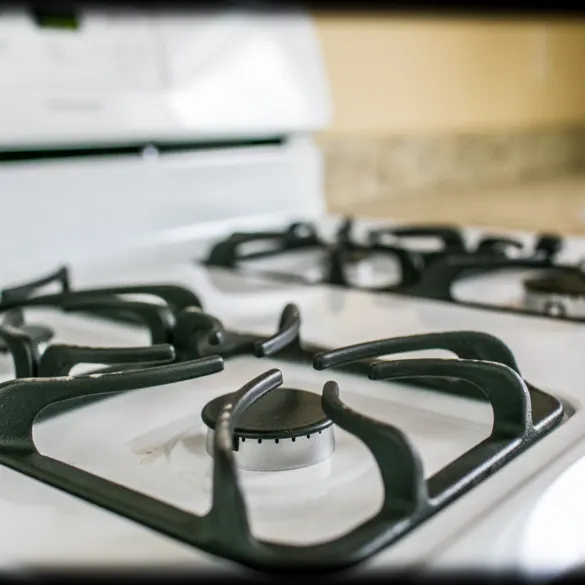
Can I Wash Stove Top Burners In The Dishwasher?
Stove-top burners are smaller and not as heavy as grates. Unfortunately, they, too, can become grimy and discolored, but should you put them in the dishwasher?
Stove top burners are usually made from cast aluminum or brass. Those made of brass can go safely into a dishwasher as they are durable, stain- and corrosive-resistant. That said, it is preferable to soak them in a solution of vinegar and water.
Aluminum will not fare well in a dishwasher as the detergent will cause the aluminum to become discolored and pitted. Instead, washing aluminum stove top burners in a mild soapy solution is better.
Alternatives To Washing Stove Top Grates In The Dishwasher
So, you might feel a bit heartsore that you shouldn’t wash your stove top grates in the dishwasher. How should you clean them then, and how often? Next, we’ll look at some handy tips and alternatives for cleaning your stove-top grates.
Washing A Stove Top Grate With Soap And Water
How you clean your stove-top grate will depend on whether it is coated. If it is coated, you should determine if the coating is enamel or porcelain so that you use the correct cleaning agents. If the grate is not coated, it should not soak in water for extended periods.
Before you immerse your grate into a soapy solution, check it for any signs of rust. If there is rust, scrape it away with fine steel wool or a non-abrasive scouring pad.
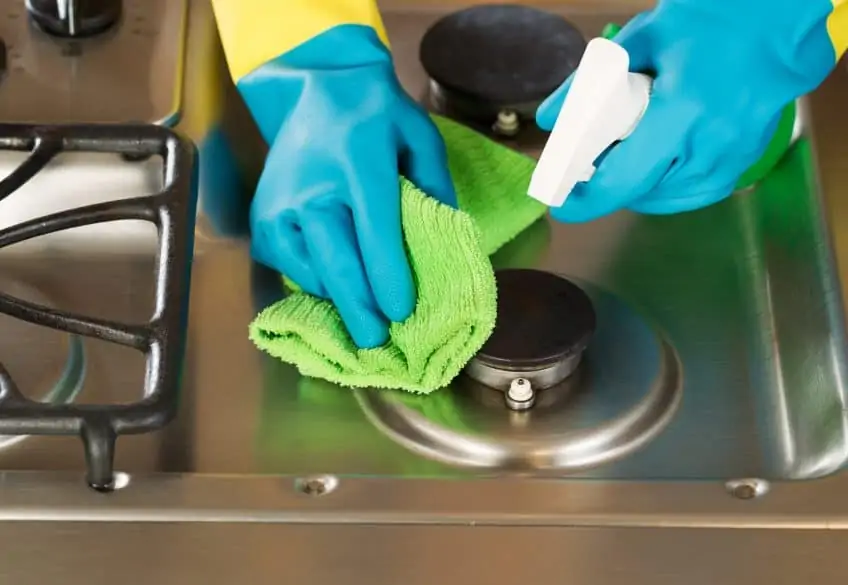
Once you have removed the rust, you can clean the grate using a mild cleaning solution of water and soap. Wipe the grate clean with a non-scratch sponge, and be sure to dry it thoroughly.
Washing Stubborn Grime Off A Grate With Baking Soda
You might find that cleaning your grate in a warm soapy solution isn’t enough to remove grime. If that is the case, you can try a baking soda paste to remove stubborn grime.
Method:
- Remove the cooled grates from the stove top.
- Then, soak the grates in hot soapy water for a short while to soften the grime.
- While they are soaking, you can make a baking soda and water paste with a ratio of 1:1.
- Remove the grates from the water and coat them with the baking soda paste.
- Wait for 20 minutes, then rinse the paste thoroughly with warm soapy water. It is essential to remove all the paste, as any residue will weaken the grate material.
- The baking soda paste should have softened or loosened some grime. You can now use a bristle brush or scouring pad to wash off the remnants of grime.
- Rinse the grates with warm water, dry them, and return to the stove top.
If this still doesn’t achieve the desired results, it’s time to pull out the vinegar.
Washing Stubborn Grime Off A Grate With Vinegar
Not only does vinegar taste great on some dishes, but it also works well as a handy household cleaner. For example, suppose your grate is very greasy and stained. In that case, a vinegar solution can help to remove excess dirt and discoloration.
Method:
- Remove the cooled grates from the stove top.
- Wash them with warm soapy water as indicated above. This will remove the surface dirt so the vinegar solution can work closer to the grate’s surface.
- Make a solution of vinegar and water at a ratio of 1:1.
- Soak the grates in this solution for 20 minutes.
- Wipe down the grates with a damp cloth. You might notice the grime now wipes off more easily.
- Dry the grates with a dry cloth and return them to the stove top.
Washing Stubborn Grime Off A Grate With Ammonia
Ammonia is found in many cleaning products and can also be used to clean your stove top grates. However, it is essential to remember that ammonia loses its efficacy when exposed to air. So, if you use ammonia to clean your stove-top grates, you will need an airtight bag big enough for each grate.
Method:
- Remove your cooled grates from the stove top.
- Place them carefully into a resealable plastic bag.
- Mix a solution of ammonia and water at a ratio of 1:1.
- Pour the solution into the bag, seal it, and leave for 8 to 12 hours.
- Wipe off loosened grime with a damp cloth.
- Thoroughly rinse and dry your grates before placing them on the stove top.
Washing Grates With Specialized Cleaning Products
If you want to avoid all the hassle of soaking and scrubbing your stove-top grates, you could use a specialized grate cleaning product instead. Remember to remove the grates from your stove top and follow the product’s usage instructions.
Additionally, you can place newspaper under the grates while you use these products and throw it away once all the grime has dripped off.
Products you could try include the following:
- Disposable cleaning wipes. These are soft and flexible wipes that you can discard after use.
- A grill and grate cleaner and degreaser with a Scotch-Brite pad, or
- An oven cleaner (place newspaper underneath while cleaning and discard it afterward).
Prevention Is Better Than Cure
While spills and spatters are inevitable, you can prevent laborious grate cleaning by preventing a build-up on your grates. You can do this by preventing pots from boiling over, wiping up spills at once, and cleaning your grates more regularly.
Not only will this prevent build-up, but it can also preserve the material on your grates. Acidic food spills, like tomato sauces and vinegar, should be wiped up immediately as they can discolor or degrade stove tops.
Other Considerations For Stove Top Grates
Aside from avoiding the dishwasher to clean your grates, there are other things you can do to lengthen the lifespan of the grates and keep them in top shape. Under some circumstances, you may need to replace your grates.
- Always ensure the controls are off before cleaning stove top grates. Ideally, the cooled grates should be removed from the stove top for cleaning purposes.
- It is preferable to clean stove top grates with warm soapy water.
- Do not use the self-cleaning cycle in an oven to clean stove-top grates and caps.
- Preserve your grates from chipping by avoiding banging against other cast iron objects.
- Do not repaint burner grates, as the fumes could be toxic. If they are faded, chipped, or worn, it would be better to replace them.
- There is no safe way of removing melted plastic on stove top grates. Therefore, it might be better to replace the grates.
As much as you might want to clean your stove-top grates in the dishwasher, it is not advisable. A dishwasher will remove the oil seasoning from the cast iron grates, causing them to rust. Instead, it is preferable to wipe down stove top grates regularly with warm soapy water. This will prevent a build-up of grime that will need more tedious cleaning at a later stage.


